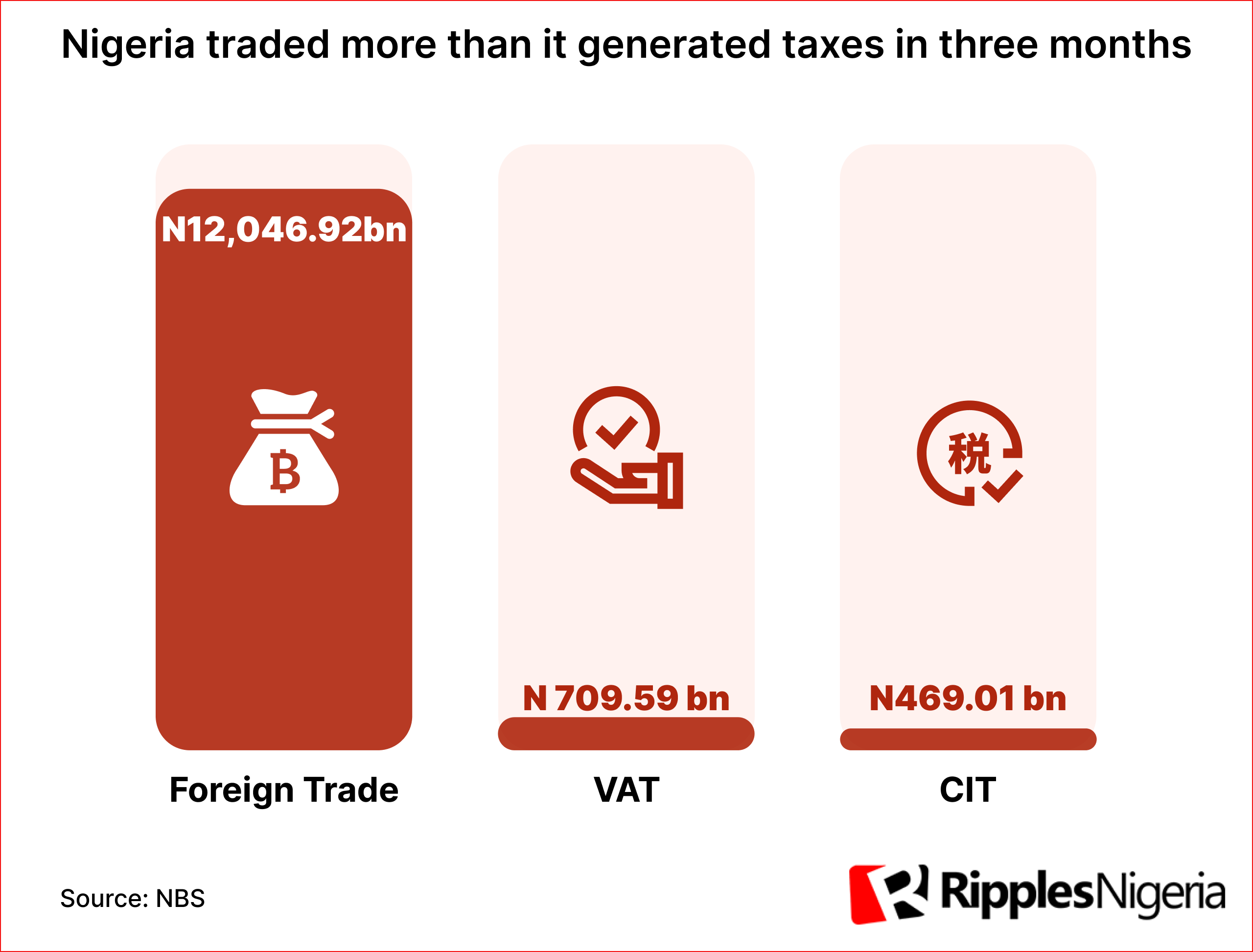Ripples Metrics
RipplesMetrics: Nigeria’s trade surpasses generated taxes in Q1, 2023

Despite several gloomy events and policies that rocked Nigeria during the first three months of 2023, the country’s foreign trade in goods hit N12 trillion in the first quarter of the year.
The figure is higher than the total revenue generated from Value Added Tax and Company Income Tax in the same period according to data from the National Bureau of Statistics (NBS).
Between January and March, the country struggled with policies like Naria redesign which suspended cash transactions for a while until the judgement by the court and the general elections which came with many social disruptions.
Amidst these economic instabilities, Nigeria’s total export trade stood at ₦6,487.04 billion while the total imports amounted to ₦5,559.88 billion. Meanwhile, the country also reported a generated tax revenue of N709.59 billion as VAT and N469.01 billion as CIT for the first quarter.
There are still concerns about Nigeria reducing import trade and focusing on local production which would also increase exports. Through this development, revenue generated from taxes can also increase simultaneously.
NBS said that the total exports increased in the first quarter by 2.00% but declined by 8.66% when compared to the amount recorded in the fourth quarter of 2022 (₦6,359.61billion) and the corresponding quarter in 2022 (₦7,102.11 billion) respectively.
Also, total imports increased by 3.67% in the first quarter of 2023 compared to the value recorded in the fourth quarter of 2022 (₦5,362.83 billion) but it declined by 25.83% when compared to the value recorded in the corresponding quarter of 2022 (₦7,495.67 billion).
Nigeria’s trade in three months
Between January and March, Nigeria exported goods to five countries. According to the data, the Netherlands had the highest trading share with (12.91 per cent). Others include the United States (8.93 per cent), Spain (7.53 per cent), France (7.51 per cent) and Indonesia (7.04 per cent).
Also, on imports China had the highest percentage share with 23.32 per cent. It was followed by the Netherlands with 10.35 per cent, Belgium with 9.32 per cent, India with 7.69 per cent and the United States with 5.11 per cent.
Top traded products within the quarter included Motor spirit, Gas oil, Durum wheat, Cane sugar, Kerosene, Sesame seeds, cocoa beans, Urea, natural gas liquified and petroleum oil.
By sector, the value of total trade in agricultural goods stood at ₦751.03 billion, solid minerals stood at ₦70.85 billion, manufactured goods traded at ₦2,527.37 billion, raw materials stood at ₦755.36 billion while Maritime transport accounted for ₦6,419.92 billion.
Taxes generated in three months
VAT for the first quarter was reported at N709.59 billion which showed a growth rate of 1.75 per cent on a quarter-on-quarter basis from N697.38 billion in the fourth quarter of 2022.
“Local payments recorded were N436.10 billion, Foreign VAT Payments were N151.13 billion, while import VAT contributed N122.37 billion in Q1 2023. On a quarter-on-quarter basis, the activities of households as employers, undifferentiated goods- and services-producing activities of households for own use recorded the highest growth rate with 349.86%, followed by construction with 95.64%”, NBS said.
Also, extraterritorial organizations and bodies had the lowest growth rate at –53.54%, followed by real estate at –47.01%.
By sector, manufacturing (29.65%); information and communication (19.29%); mining & quarrying (12.24%) had the largest shares.
Meanwhile, CIT for Q1 2023 indicated a growth rate of -37.79% on a quarter-on-quarter basis from N753.88 billion in Q4 2022.
The local payments received were N300.78 billion, while Foreign CIT Payment contributed N168.23 billion in Q1 2023.
NBS said, “On a quarter-on-quarter basis, the financial and insurance activities recorded the highest growth rate with 50.42%, followed by construction with 42.32%.
“On the other hand, water supply, sewage, waste management, and remediation activities had the lowest growth rate with – 69.38%, followed by other service activities with -60.13%. In terms of sectoral contributions, the top three largest shares in Q1 2023 were financial & insurance activities with 22.94%; manufacturing with 20.91%; and information and communication with 11.89%.”
With the assumption of a new president, experts are calling for a better fiscal policy that can drive the country amidst the rising inflation and other key parameters. Ripples Nigeria reviewed how President Bola Tinubu can tweak the ecosystem to make the country become a tech-driven economy.
Also, the president has also solicited the support of international countries and private organisations to join forces in rebuilding the country’s economy.
By James Odunayo
Join the conversation
Support Ripples Nigeria, hold up solutions journalism
Balanced, fearless journalism driven by data comes at huge financial costs.
As a media platform, we hold leadership accountable and will not trade the right to press freedom and free speech for a piece of cake.
If you like what we do, and are ready to uphold solutions journalism, kindly donate to the Ripples Nigeria cause.
Your support would help to ensure that citizens and institutions continue to have free access to credible and reliable information for societal development.
























